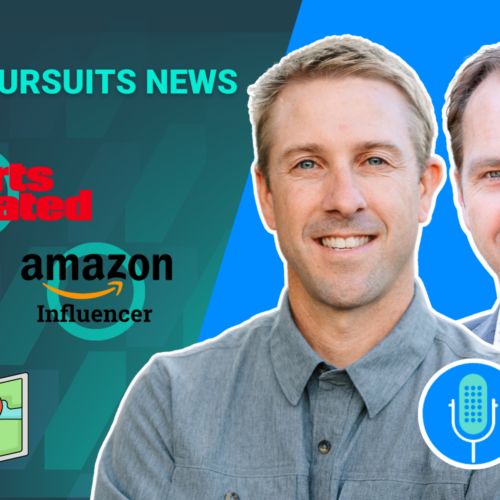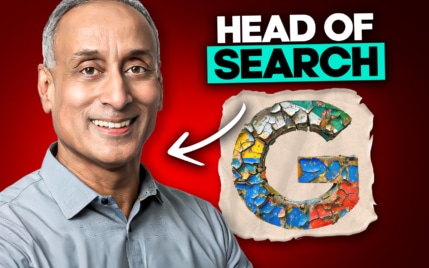How I Vetted 744 Marketing Providers and Match Agencies and Clients

When you buy something through one of the links on our site, we may earn an affiliate commission.
Behdad Jamshidi is a former engineer turned marketing consultant. A few years back, he decided to adapt his problem-solving skills to vet over 700 marketing providers and joins us to share his findings.
Why is this helpful?
He helps businesses understand marketing and marketers understand the business side of things.
In other words, his insights give those looking to hire - helpful tips to make better decisions.
And on the flip side, he helps service providers gain a competitive advantage by better understanding where businesses are directing their marketing budgets.
For those looking to hire, he stresses the significance of understanding business goals before hiring out to an agency's services.
When vetting agencies, he suggests inquiring about their growth story, longevity, and team structure, recommending stable agencies with 5-15 employees or niche agencies with strong pod structures. And he highlights the importance of passionate team members for ensuring quality work and advises building relationships with the team members you'll be working with.
He also explains how marketing trends are shifting toward building brand presence and customer connections. And shares great insights for agencies on how key investment areas are trending toward email marketing, SEO, and influencer marketing. He also highlights content repurposing and social media as increasingly attractive marketing strategies for businesses.
Another interesting area Behdad discusses both for businesses and agencies are the red flags he highlights.
Things like:
- Agencies claiming to be full-service,
- Boasting rapid growth rates,
- And showcasing big-name clients without clear involvement.
Overall, he shares how successful businesses exhibit long-term thinking, have a dedicated marketing budget, and possess internal staff who understand marketing language.
As he covers, marketing is a journey where we need to test strategies and continuously improve over time, and with advice like what's shared in this episode, we can have the confidence we're heading in the right direction.
Watch The Interview
Topics Behdad Jamshidi Covers
- Marketing vs business people
- Becoming a head hunter for marketing agencies
- Matching needs
- The pre-requisites before beginning to strategize marketing
- Today's marketing landscape
- SEO's role in today's marketing world
- Repurposing content
- How to vet agencies
- Uncovering complementary partnerships
- And lots more...
Links & Resources
- Match Making Service To Find the Right Marketing Agencies (cjammarketing.com)
- Behdad Jamshidi - P.Eng. | LinkedIn
- Use coupon code “podcast” to get $15 off Link Whisper to build smarter internal links fast!
- Get SEO Consulting from the Niche Pursuits Podcast Host, Jared Bauman.
Transcription
Jared: All right. Welcome back to the niche pursuits podcast. My name is Jared Bauman. And today we're joined by Bedad Jamshidi. Welcome on board.
Behdad: Thanks for having me on the
Jared: show, Jared. It's good to have you. It's good to talk to, uh, to someone and we're talking really about agency. Life today. And certainly all the things that you have when it comes to working with agencies, um, I, I run an agency myself for my, for my full time job.
So I feel like we'll have a lot to chat about here, but, um, you know, before we kind of get into what we're, what we're going to address today and whatever he's going to, going to be hearing, maybe give us a little background on yourself, catch us up to, to who you've been, you know, uh, up until you started doing what you're doing now.
Behdad: Sure, that sounds good. Uh, I'll give you the two minute background here. There you go. I actually started as an engineer. I used to work as a sales engineer for a company very similar to Verizon in the U. S., but up in Canada, it was called Telus. Um, and I was working on the B2B side of things. So typically working with businesses in the mid market space from 50 to 1000 type employee range talking to like C level executives, IT, understanding what's going on in businesses, and then building out technology roadmaps of like, how do you get from A to B to C, and it would touch other aspects of the business, of course, as well.
And so that's where a lot of, like, my business consulting, sales, leadership and technology experience came from. Um, and then on the marketing side, I got into it really randomly. Um. Took a course, started building websites, doing Google ads, doing SEO, uh, for small businesses, nothing crazy. Um, but very quickly I realized I hated doing 80 hour websites on the weekend.
Um, it was not what I was going to do for the rest of my life. Uh, and I was making really good money as an engineer, so it didn't make a lot of sense. And so I started partnering with different marketing agencies and partners and started very quickly realizing that most marketing agencies didn't understand business and most business people didn't understand marketing.
And there's always this gap. So you put these two people in the same meeting. They don't speak the same language. Uh, and then agencies would pick up work that they shouldn't pick up. Right? They might be really good at building websites, but they're not really good at the Google ads. The SEO, the influencer marketing side, but they would say they are.
And so that drove me nuts. And I thought foolishly that I could just find 10 marketing agencies that I really like and then solve all the world's problems. That's not what ended up happening. So. I ended up talking to about 744 different marketing agencies and partners over the last five years and built a vetted list of about 90 plus partners that I work with.
And so I talk to businesses now, see what they need, and then basically puzzle piece together, uh, which partners make the most sense for them to work with.
Jared: That's very, very interesting. It's like a headhunter for agencies in many ways. I mean, what about your engineering background? Do you think made you? A good fit for something like this, because it does seem like, I mean, oftentimes we think engineering and marketing don't go together, right?
Or they are speaking of different languages at the table.
Behdad: Yeah, no, that's a great question. I think one of the biggest things, just one, we like to problem solve, like the way that my brain works is just like, how do I solve problems? And this is a pretty big problem to solve. Uh, so that's kind of like one aspect of it and also just like the job that I used to do, like being able to understand businesses is one of the biggest aspects, like being able to talk to people, understand kind of where their business is headed, understanding personalities, and then how does that fit in with like a proper match on the marketing agency side?
And so I took a lot of the skill set that I had at that full time job and it translated over to this like marketing broker slash super connector role.
Jared: I think a lot of people listening are going to be familiar with an agency and potentially its role or roles that it can help, uh, either a company or even an individual in, right?
Like we can kind of think about the ways that an agency might help. But at the same time you mentioned at the outset, like a lot of times agencies are taken on the wrong work or people are hiring agencies for the wrong reasons. What It's a broad question, but like, what are the right reasons to hire or to look to hire an agency?
I'm just trying to think of the person listening who is wrestling with that question. Yeah,
Behdad: no, it's a great question. Um, I mean, it really just comes down to where the business is at and what kind of budget they're working with. Um, and I do work with just to clarify, like, you know, different marketing consultants and fractional CMOs and designers, copywriters.
Um, it's not just agencies that I've talked to over the time, but it's, it's all aspects. And so really what it comes down to one is like where are businesses at in terms of growth, right? If you're like a sub 500, 000 business, uh, you likely are going to be hiring, you know, freelancers or specialty type consultants to kind of get you from, you know, a level zero to like a level three.
Um, or just like there's really specific, um, small types of agencies that focus on that kind of customer segment. Um, but there's not a lot you can do at that stage, uh, with agencies as you kind of like grow through the business and you get to, let's say, the 500 to 3 million range. This is where you start bringing on agencies where you're like, I want to turn on these specific marketing channels.
So it's. I want to do SEO and I run, want to run some ads, for example. Um, you'll look for an agency that does those two things well, and maybe you use them for some of the other stuff, but you know that they don't do it as like one of their primary. core skill sets. Um, like say email marketing, for example, gets tied into that, but you don't want to work with like two or three partners because of the size you're at, you can't really manage those partners effectively.
Um, and then as your business growth, let's say you start getting to that, like three or 10 million mark. That's where you start kind of hitting that scale. And you know, you're looking for very niche specific partners are like, all they do is like SEO or all they do is ad buying or all they do is social media because you want someone that really understands that, um, you know, That part of marketing to help you scale to kind of the next level.
And by that time you should have at least one marketing resource in house that can basically guide all of it, like a marketing director or a coordinator or anything like that. So that's just how I think about it.
Jared: What, um, what tools do you think that people need to have to go into, uh, like interviewing an agency or interviewing, you know, what kind of questions do they need to ask?
What kind of, um, uh, processes do they need to understand before going into that? Uh, I said with, uh, kind of a, a laugh, right? Like it's hard to, to ask an agency or even an individual, if you're hiring a freelancer to do something, if you don't even know how you want it done yourself. So not only what questions to ask, but like, do you need to have all your processes figured out?
Is that something you're going to hand them? Or do you need to go with an open mind about how they're going to do
Behdad: it? Yeah, I mean, that's a great question. There's a lot of like you're trying to find the right partner, right? Like it's the same thing in real life as it is in business. And so, um, one, you need to have an understanding of the things that you're trying to hire for.
So most founders and most business owners don't have at least like an average level of understanding when it comes to marketing. And so it becomes really hard to actually vet partners properly. Like typically what I see with business owners is. Someone says, Hey, you need to go do SEO. And then they start running down the path of SEO without understanding how it fits into the overall picture.
So I'd say before you even start like betting one, understand what kind of business goals you're trying to achieve and then look and understand what avenues you can use in marketing to achieve that. So that if you do end up talking to say more of a specialized agency that does SEO or one that does Google ads, you can actually go, okay, this is not the only answer to this.
I'm going to actually talk to a bunch of different partners and then figure out what strategy actually makes sense for me. And then in terms of like some of the questions that you can ask, one is one of the main ones I like to ask when I talk to agencies is how they got to where they are and I have yet to hear a business owner asked this question on a call with an agency owner because when you actually understand the story of how they grew and what they did before they started running the agency, you get some insights into what their core competency is.
Right. And so the core competency might have started out as SEO or, you know, they were a copywriter or whatever it is. And then you kind of start understanding how it morphs into the rest of the agency. Um, the other thing is how long an agency has been around. Like typically what you want to see is an agency being around for at least five years because that's when they've kind of like gone through some growth.
They've gone through some pains. They figured out what customers they can help, which ones they can't help. Um, and they have the systems and processes in place to work with a business. Um, so that'd be another question I ask, and then I'll give you one more just so that we have three, um, knowing the team that you're working with, um, and how the overall marketing organization is structured.
Right? So if you're working with a smaller team, let's say you have an agency that's anywhere from 3 to 15 people. Understand who they have on their team internally. Um, and then if you're working with a larger agency, understand how they structure their teams. Is it in pods? Okay, great. If it's in a pod, who are you working with?
Because at the end of the day, you want their expertise and you want to talk to them before you hire this agency because you want to make sure that that's a personality fit for you.
Jared: I have questions on each of those, but before, before I ask, um, let me go back to the thing you referenced at the beginning of that answer and maybe ask a secondary or a follow up question that, um, and I think this is gonna be interesting for people listening because I think, uh, people are going to come at different tasks or different responsibilities they have, and we all have our own mindset about how we need it to be done.
And chances are we're a little limited. In how we think about it, uh, not necessarily, but chances are that when we would go and engage with an agency, a freelancer, an expert, they might approach it a little bit differently. And it's hard to, how do you, how do you hire, how do you talk to someone about something when you know you need help with it, but you know, you need someone who's better at it than you are.
It's difficult to vet that, right? It's difficult to vet that someone is more experienced at something and understands it at a more intricate level than you do. But at the same time, that's what you probably need to take your business to the next level.
Behdad: Yeah, no, that's a great question. Um, and it just depends on the kind of the resources you have.
But one of the biggest things I would say is hire an external marketing consultant on the outside that can potentially come with you into those meetings and at least be like a feedback mechanism for you to be able to ask the questions of like, Hey, look, these are the companies that I've interviewed.
Here's kind of the strategies you're talking about. I'm going to pay you, you know, an hourly rate of like, let's say 500 an hour to help me answer some of this question. And maybe it might be a two or three hour thing, but it at least saves you from making that like initial wrong mistake of not having the right strategy initially.
Um, that would be my advice is to have someone as a sounding board. And if you can pay for someone as a sounding board, great. And if you can't, there are different communities. I mean, I'm sure everyone has their own community of business owners and things to talk about, like bounce those ideas off them and see if other people have had, you know, that same strategy, maybe made that same mistake.
Okay. Um, don't take what agencies tell you at face value because they're only going to tell you what they know and what they can support. Um, so they might leave certain things out of it. Um, or the other thing is when people talk to me, I'm very transparent. I'm like, look, you're going down this road.
You're going to hit these kind of roadblocks and you're going to have to be prepared to be to go through that long term, right? Like, um, a lot of people don't think, you know, you throw some money at Google ads and you're, you're off to the races, but then you got to look at how the landing page, the copy, um, are you AB testing?
Are you improving that? Are you sending people into an email list to nurture them long term? There's all of these things that people don't think about when they turn on a channel, um, into how to optimize it over time so that actually becomes profitable for the business. And also, I mean, we got to add to the fact that is your the business model you have profitable can can it be profitable with the channels you're choosing.
You had
Jared: three things to look for three types of questions to ask. Um, I'm sure there's more, but you, you know, again, you kind of have to boil it down for the sake of the podcast. And the third one you said was about the team and the structure behind it. I mean, I've got to imagine. All sorts of agencies have all sorts of structures and all sorts of ways that they work with their clients, which ones, like what are some, some shining examples of ones you've seen maybe traditionally work well, or historically work really well that people can kind of hear from, because I can imagine a lot of people might ask that question, like, what's your team structure like?
And they'll come back and say it. And you're like, okay, well, what do I do with that? What does that mean?
Behdad: That is very fair. I can answer that question by like what agencies I like the most. And so typically when you have an agency that's anywhere from like 5 to 15 people, and they're not looking to grow and they're like we're this size and these are the types of customers that we work with and these are the types of people that we help.
those agencies I really like because they're usually pretty stable. Um, it's the ones that, yeah, so that would be number one. The second one would be if you're working with more kind of like niche type agencies, sometimes they end up being larger, right? Like they're 25 to 45 people type thing. You'd be looking for the ones that have really strong parts, pod structures.
And, um, that would probably be the best way to find, um, Like a solid agency in that area. So if you're working with like an SEO agency, that's larger, um, meet the pod and find out who the SEO strategist is in the pod and who the developer is, who the designer is, and, um, be comfortable with them because that's the people you're going to be working with.
And the other little like tidbit is, um, find out how much they like doing their job, like find some passion behind the people that you're about to hire. Um, cause if there's no passion there and it looks like they're just. Burnt out and you know, taking on too many clients, uh, they're likely going to be burnt out when they're working on your stuff.
Jared: How would you find out about passion? I mean, what sort of questions or is there a way to gauge that? I mean, I've got to imagine that there's, um, there's certain questions that will just generate certain generic responses to check the box to some degree. Like what kind of questions could you ask to kind of determine that?
I
Behdad: mean, you ask everyone there. Why? Right. Like, so as a part of my interview process for agencies, like one of my questions, like, why are you in business? Like, why are you doing what you're doing? And the same question to be around, like, if you have an SEO strategy, like, why do you enjoy doing SEO? Like, how did you get into it?
And just like, you can tell when people are passionate about what they do. Uh, it just comes through, man. Um, I'm sure you've talked to business owners were like, yeah, I do my business and this is what I'm doing. Uh, and I've done it for 15 years. And then you have people like, I've done this for 15 years and I absolutely love what I'm doing.
I love my team and I love the customers I'm working with. And it's just this energy you get from people. Um, that's, I guess that's, it's hard to explain in words. You just kind of feel it.
Jared: I want to come back to a couple of these things, but almost taking a right turn here in the, in the interview. I want to ask you more about your growth as in your business.
I mean, Uh, you know, you shifted from engineer, but I think now's maybe a good time to ask you about how you kind of set up and grew your business, how long it took, what that road looked like, because I bet there's a lot of parallels for people listening in terms of what you went through to grow your business to where it is now.
Yeah,
Behdad: no, absolutely. Um, so I started this business about five years ago. Um, and I just knew in my head that I'm like, this is gonna be a grind. Uh, I'm gonna have to mail a lot of connections. I'm gonna have to meet a lot of different types of people. And it was a very slow growth, right? Like, as my business was growing, the model would change and shift a little bit.
Um, I actually hit a point in three years in running the business where I was working, you know, my full time job and doing this, I was probably putting 12 to 16 hour days in working weekends, that kind of stuff. Um, and at three years I was like, man, um, I've been working at this for so long and I'm making this amount of money and You know, I can't I can't leave my full time engineering job for this.
Um, and so I made a goal that year and I said, if I can't hit this amount of money, you know, you know, the number was somewhere between, like, 7500 and 10 grand. Um, by the end of the year, um, then. I might have to give this up, but in my gut, like that never felt right because I thought I had a business that made a lot of sense and it was helping a lot of people and I saw it work when it worked.
Um, and I hit that number within 3 months of setting that goal. And then that year just went like crazy. Like, it was just nuts. Um, and it got to the end of the year where I was like, alright, now I'm losing opportunities by staying in my full time job. Um, and I was making more than my engineering salary at that point.
I'm And so, man, I, before I left the full time gig, like I was never the type of person I was like, I'm just going to jump in and go at it being an engineer, I'm pretty risk averse, uh, learning how to transition out of that. Um, but I had a pretty solid nest egg within the business built up. I was making solid amount of revenue a month where it was covering my costs.
And that way, when I left and hit the recession this year, for example, right? Um, I was never in a position of like, Oh, I have to go back and work full time. So my recommendation to people is the people that are, you know, maybe a little bit more risk averse, kind of like me when I started out, build yourself a solid nest egg, um, before you jump and so that you have, you know, I had like two years of runway before I left.
Um, and that just kind of gives you a little bit more calm and then just go for it after
Jared: that. That is a good runway. That's a good, that's two years. Um, that's solid. That's really good. You, you, um, you did a good job, uh, preparing. What was it about that three month period that caused it to accelerate? I mean, was it as simple as putting the goal down on paper?
And now you had a goal, you kind of had something to strive for. I mean, that sounds a little fairytale ish, but like, what was it that changed and allowed you to accelerate it so quickly?
Behdad: Man, honestly, it was just I picked up a few customers that kind of came out of nowhere. I don't even know how else to explain it.
It's like the, you know, when people say like the universal lines and all this, I'm like, that's pretty much what happened. Um, and then it just kind of went from there. I think, I think what will happen realistically under the scenes was I was the flywheel effect was starting to take effect because I was meeting with so many different people and talking to so many different people showing up all the time.
Um, and it just started creating this kind of, like, chain effect, um, that allowed for people to know who I was and what I did and referrals to come from different directions. Um, and I think that's what it was. It's just laying the groundwork and letting the flywheel take effect over time. Um, and I was never thinking of, like, you know, short term, like, how do I make this work in 3 months?
I just. Stuck to my guns and did what I needed to do.
Jared: So this is definitely an aside. This is, uh, but, but like you see a lot of marketing happening, right? Cause you're working with a lot of clients. You're working a lot of agencies. Uh, we're going into 2024 here and we're going to start a new year where certainly.
The world is rapidly changing. I don't need to beat this dead horse that everyone knows between AI, between all the different facets of market, right? But let's just from a high level, like we don't often get outside of our own little heads and our own little worlds. Perhaps you have some outside perspective.
What do you see working right now in terms of broad level marketing? Perhaps it's a little different, a little new this year and last year.
Behdad: Yeah. I mean, the biggest shift. Uh, is that we're kind of going back to like the old version of marketing where it's like you need to be building your brand and building your presence, uh, and connecting with your customers and, uh, being able to understand who they are.
Like, I've seen more of a shift to people doing like email marketing and now like building up their brands and their personal brand and their authority and PR, like all the stuff that was not Google and Facebook is now like starting to pick up again because people are starting to realize like how it is like this full circle marketing aspect that you need to be using.
Um, AI is obviously a super interesting topic, uh, and I'm sure there's a lot of people in this call that know way more about it than I do, um, and are using it in effective ways where, I mean, obviously it can increase the amount of copy and things that you do, but you still need the human aspect to into it and the authority aspect into it.
There are not a lot of people doing that really, really well, but the ones that are, I think, are, um, hidden underneath and, um, hiding. Um, and then outside of that, like, I mean, you've seen what's going to happen with TikTok and people being able to buy off the platform and influencer marketing become even bigger.
So that's, like, kind of, like, where these. The things are kind of shifting, um, into one, the full circle marketing and making sure you actually have a proper marketing strategy that you can stick to and the right brand messaging out to the customers. Um, and then the other aspects of these, like AI and TikTok and how they're shifting and how you could capitalize on it.
I mean, if you're a B2C type business or, um, someone that could use influencers to guide, uh, people into your ecosystem.
Jared: How are you seeing, like if I, how are you seeing the budget allocation shift, if at all over the, over the last couple of years? Um, Yeah. If our reading between the lines, maybe you're saying that influencer marketing is even more effective than it was a couple of years ago.
Are companies allocating more of their marketing budget towards influencer marketing? Or, yeah, you also mentioned some of the old stuff working really well. Email marketing and stuff like that. How are budgets shifting, I guess, in terms of where dollars more and more are going for companies?
Behdad: Yeah, I mean, like, people are definitely moving away more from, like, the Facebook and, like, Google Ads is still doing well, um, I still see people spending money on there, um, people are spending less money on Facebook, um, and then they're moving it over to testing out new channels, like, SEO has definitely been growing, like, more and more people are thinking about that, even with all The Google changes that are coming, uh, no one really knows where SEO is going to be in the next year.
Um, with all the AI stuff, but people are still investing in those areas on the email marketing front. It's a lot around like email marketing strategy. Um, and then making sure that you're doing the AB testing and also sending out emails, um, in a good cadence, right? Like, and to the right customers and segmenting properly.
And so I've seen that have an uptick. Um, and then in my customer base, because e commerce got hit quite a bit. I mean, I work with all customers of all sorts, right? So that's the other aspect like, uh, from the B2B to e com to, um, you know, content of coaches and stuff, but, um, the e com aspects has been a bit hit.
I haven't been able to see if people are like, are reinvesting into TikTok and influencers as much because. A lot of the customers that I was kind of dealing with didn't really save too much for a rainy day. Um, right now that we're kind of where we are now, but the ones that have, um, are more stable and growing, they've kind of like stuck to their guns.
They weather the storm, um, knowing that there's certain times where there's going to be like peaks, um, and then when they, it's kind of like the The stock market, they know when like things are going down, they kind of save reserve. And then when things are going up, they're ready to like scale and move up, right?
Customers will come back, right? So that's the other aspect. Um, and they're, they're mostly sticking to what works for them. So SEO, email marketing, um, and then testing out other channels like influencer. And people are kind of moving over to YouTube now as well. I've heard, I've seen a lot of shift, uh, in terms of people thinking of, you know, building up a channel and an audience.
Jared: All that makes sense. It's a bit interesting to hear because I'm sure a lot of listeners who, who listened to this podcast are heavily involved in the SEO space. That's certainly a trend that this listener audience has. And certainly it's been a wild and wacky 2023 when it comes to the SEO world from AI and its role in kind of SGE.
Google search generative experience to then the updates and there weren't really more updates in 2023 from Google's perspective, but they were more impactful. They were more landscape shifting. There's a lot of results that are now ranking that that types of results that didn't rank before. So it's just so fascinating to hear from someone like you, a little bit more removed, a little bit more high up in terms of perspective saying, Hey, brands are still very bullish about SEO, but along with some other areas.
Behdad: Yeah, 100%. Um, yeah, SEO is still, still on a lot of people's marketing strategy because you also reuse that content for everything else to write. Like, I'm sure the audience knows you write, you know, SEO blog content, but then that goes on your LinkedIn and it goes on your X and it goes on all these different platforms.
And so it becomes just content generation machine. So I think that's also like, as we're talking about is the other kind of shift is like, how do you repurpose that content across so many different places and just yeah. Um, so that you're not just investing just in blogs, but on how it goes everywhere else.
So social media starts kind of playing into that factor as well. Yeah.
Jared: Hey, so let's kind of shift back to some of the stuff that we were talking about earlier. We were talking earlier about how to hire an agency, what to look for in an agency. Let's, let's kind of, you know, jump forward, assume that you're working with an agency, you've figured that out.
Um, how do you recommend Businesses measure the success of, uh, their agency, their agencies, their partnerships, just the ways that they're investing in marketing, you know, any tips or any recommendations for you as you see companies measuring
Behdad: that. Yeah. I mean, just at the high level, as we talk, like know what your business goals are and what your KPIs are for your business so that you can tie the marketing to that.
Um, and make sure that you're, you're having follow ups with your marketing and you should be like, Hey, look, like these are KPIs. How are we tracking well against them and just don't kind of just let it like a lot of business owners will hire marketing agencies and let them do their thing. They'll ignore the reports like you need to have someone looking at these things and just tracking what's going on.
Um, and if that's not you, like hire someone even on a fractional basis or part time basis to do that for you internally. Um, and then when it comes down to like. When you're working with partners and when it's time to kind of like switch out, like you'll start realizing at some point, like they start getting less specific on like what the next stage of growth is or what kind of avenues they can use or that type of thing.
You'll start kind of feeling like, okay, we're getting a little bit too big for this agency. So usually an agency might be able to get you from say, like a level zero to a level three or four, or say you start at a level three or four and you need to get to a level seven. Um, at some point you'll need to upgrade your agencies.
Um, and you'll start getting that kind of feeling and you can always bring in an outside consultant just to look at things or even bring in other agencies to just do an audit periodically, right? Like, Hey, we have someone running our stuff. This is what they're doing. This is the price that they're doing at.
Can you do better? Um, and can you prove that you can do better? What would you do better? And you can use those audits, whether it's to go back to that same agency and say, hey, can we improve on some of this stuff? Or really, they're neglecting things and you're like, okay, we need to move off. Just gives you some more insight and keeps them accountable.
Um, And that's a, that's like most of the, like two of the top things that I would kind of do there.
Jared: How do you distinguish between when it's time to move on from an agency versus just have a kind of restructuring conversation? How do you know when they're fledging versus when you need to give them better direction on where you want them to be focusing?
Behdad: Yeah, that's a, that's a super hard question to answer. Like when I'm talking to a customer. Um, I can usually tell by them, like, Hey, how much are you paying? How long have you been doing it for? And what are you getting out of it? Like, and you're like, okay, listen, like, because I've talked to so many different agencies, I know like different price points and what people should be getting for what amount of money.
Um, it's hard for a business owner to know that. Um, so like, I don't have a good answer for that. Um, this, you just need to have enough, like understanding. So maybe it might just be going into like a business community of people that you trust and saying, Hey, this is what I'm getting. This is the number of results.
Does anyone else experience the same thing or better? Um, and that just might be a way of comparing and contrasting in a quick way. Um, if your agency is good enough, uh, or if there's someone better out there.
Jared: When in doubt, ask around. Yeah. Um, how about some red flags? I mean, you kind of mentioned a little bit when you said things that qualifiers, in terms of, um, you know, their origin story.
Uh, age in business, um, uh, the team you'll be working with. But maybe, maybe those are more things to look for. What are red flags? And then the follow up question will be, how do you pick up on them? But let's start with the red flags to look out for.
Behdad: Yeah, so one of the red flags, if you hear an agency say that they're a full service marketing agency, like that is a massive red flag for me because they are unicorns and most agencies are not full service.
Um, so like, try to guide into and go into like one to three things that they do really, really well. Um, and so if you ever see like an agency also like show you a slide of like, we do these nine things. I've actually stopped them and said, okay, well, tell me which three you do really, really well. And then tell me like, which ones you do on the side of your desk.
And the conversation gets pretty real from there. Um, so that'd be one of the things that I would do. Um, if an agency is boasting about like how fast they're growing. Um, you know, we've done, we grew a hundred percent last year. We're going a hundred percent this year. We're constantly picking up new customers.
Um, that's another red flag for me. Um, because agencies can't really grow that fast. Typically, you want an agency growing at like, you know, 10 to 20 percent a year and like a, uh, a steady rate. That means that their inside systems won't break on when their inside systems break, then you kind of like suffer for it as a business.
So that would be another one. Um, and then whenever you see the big name logos, um, Start digging into it and go and like, what did you do specifically for those logos? And how did you get those relationships? Like, how did you get, um, you know, Red Bull as a client when it only looks like you have two big clients and the rest are small clients, right?
Um, and a lot of times you might find out like, oh, okay, the founder worked with Red Bull when they were working at an agency, but they haven't actually worked with them in this agency. Um, and so you can kind of like get a little bit deeper into, um, what they're sharing and seeing if they're transparent on the front end, um, more than anything, right?
Jared: Yeah, interesting. Those are some really good things to dive into. I think that, um, in terms of red flags, you're probably never going to find a perfect fit. You know, like, I doubt I could be reading into it, but I doubt if you ask all the questions you said at the front end, you look for all these different flags as you evaluate them, something's going to come up.
Something's going to be a little bit less than perfect, you know, like which ones are the ones that are going to sink your battleship per se? Which ones can you be a little bit forgiving on? Which ones have you seen historically allow you if you can't find perfect to still find a good relationship?
Behdad: Yeah.
I mean, when it comes to matching businesses with marketing agencies, well, and like. The biggest thing that I do is to make sure that people understand like it's a relationship at the end of the day and no relationship is a hundred percent. Um, right. Like if you have a marketing partner relationship, uh, and it's at 85 percent of the way there, like you have a good relationship there.
Work on that next 15%. Uh, don't go looking for the a hundred percent cause it's not there. In terms of marketing agencies for me, like it has to come around the values, right? Like, do they really care about their customers? Are they transparent? Have they done good work? And have they been around for long enough, right?
Like those are the foundational stuff. Um, and then when I'm doing my like vetting, uh, I do about, you know, a 30 minute call on the front end and about, you know, 85 out of every a hundred agencies, I don't go to a second call. Um, for the ones that we do go through my deep dive, I go through like 30 to 35 different questions.
Um, and so the things that like, when you do that kind of deep dive, you start really understanding like what their strengths and what their weaknesses are, because every agency is going to have strengths and every agency is going to have weaknesses and then you, from my perspective, it's been matching that with the strengths of a business, the personalities of a business and the weaknesses of a business.
Um, and that's what makes the matchmaking work. Um, it's really, so if you're doing this as a business owner, you're going to need to know your personality, you need to know your strengths, you need to know your weaknesses, and then work on figuring that out on the agency side and seeing if you can work together.
Jared: Let's, let's talk maybe as we start to bring it. To a, to a close, let's talk about what you see effective businesses doing when it comes to the broad, the broad strokes of, of hiring an agency and utilizing them. Right? Because, um, and I'm just going to give a little bit of perspective, you know, many people listening, an agency hire would be their first time hiring agency.
And that comes with a whole lot of different, uh, changes, you know, internally, you've got to, Outsource something, you've got to trust someone else with something, a pivotal part of it, or people listening might be switching agencies to a different agency or looking to bring on an additional agency in addition to the one they already have working.
What are things that trends or mindsets that successful businesses? That succeed at working with agencies exhibit.
Behdad: Yeah. I mean, it's the, it's a long term thinking is number one, like people who are like, okay, we know that marketing is going to take a while and we're not going to hit a home run in the first month to three months.
Right. Um, think about your relationships long term is number one. People who have a marketing budget set aside, like they know, like, Hey, we're spending this marketing budget over the next 12 months. Um, and it's something that you're comfortable spending, even if you don't get all of it returned back, right?
Um, making sure that you're, you're assessing the risk there. Um, the other thing is businesses that do really, really well are the ones that actually have someone internally that can speak the marketing language and be kind of like that filter. So whether that's the founder really understands marketing and they're doing it initially.
Right, building up their own knowledge and being able to have those conversations or having something like a fractional CMO or a fractional marketing director or someone to at least be that interface. Um, so that there's no, like, context being lost, uh, between what an agency says and then what, what a customer is understanding from what they're saying.
Um, those would be some of the biggest ones, like, think long term, make sure that you're, you have some sort of budget set aside that's not like your do or die, um, and then also just, uh, having some sort of, uh, conduit that can, um, be the translator between the two.
Jared: Agency versus freelancer, when would you want to hire an agency versus when do you want to hire, call it an individual, uh, a specialist to come
Behdad: in?
Yeah, for me, that, that distinction really comes down to like, okay, it's the marketing service that I'm getting. Do they need like a team? Like, let's say like, does it take four or five people to do this thing well? Typically, that's when I'll like lean to an agency because they have the whole team kind of built out and they've built out the relationships and all that different kind of stuff ahead of hand when you're looking kind of for like that freelancer or contractor, you're looking to get something very specific done.
So let's say you internally are doing the content. Copywriting and all that different kind of stuff, but you need an SEO strategist to make sure things are in line. Like I would hire probably a specialist or a freelancer to help on that front. But if you're like, okay, I need to outsource a lot of my SEO.
Um, then you start looking at, um, agencies or even maybe, um, content agencies to get that stuff done for you. Cause you don't want to hire, you know, six to eight different copywriters. Cause that's how much content you need to push out. So, um, to basically we'll look at like, um, what you're trying to achieve in marketing, what skill sets are needed to do that.
Is it multiple people try to find an agency to do it? And if it's like one person that you can use for their skill set and then other people, um, then you use that freelancer route.
Jared: Man, you have a lot of experience at this. You can tell when you said that you work with hundreds and hundreds of agencies.
You can tell that you obviously have worked with a lot of different brands over the years. I mean, any final thoughts? Uh, any things I didn't ask you about that would be relevant? And again, a lot of the people listening are going to be. Um, are going to be, uh, just trying to wrestle with that question of growth this year.
And I think probably listening to this episode with a pen and paper in hand, kind of saying like, man, for my situation, how do I evaluate whether to take the leap of faith and hire someone else to come into this business to help it grow? I mean, anything we didn't cover that would help them answer that, that large overriding question.
Behdad: Yeah, I mean, the biggest thing I think for me, uh, to tell the audience is like, when you're going through marketing, consider a journey, uh, and it's just like business, you're going to make mistakes, uh, you're going to hire the wrong agency, you're going to have those, those experiences, but just because you're, you hire the wrong agency doesn't mean you got zero value out of it, right?
Like they may have built out, you know, your first email funnel, they may have built out your first, you know, content strategy and you can build on those. Um, learnings and those mistakes that, that you are going to make in business. Um, right. And so obviously we want to reduce mistakes, but it's, it's part of the process and marketing is, um, all about testing and seeing if something works, taking that information and then trying it better the next time.
Some of the most effective marketers that I know, I mean, it took them six or seven years to learn how to build proper funnels, but now they know them so well that they can build multimillion dollar businesses just because they know how the system works. And so put in the time, put in the effort, understand the marketing aspect.
Um, and I think it'll help you in the longterm.
Jared: Yeah. Give yourself a little grace along the way. I like your, uh, your approach of not trying to hit a home run out of the gate. You know, that's, that's a tough thing to do. Uh, Hey, so where can people learn more about what you do? Where can people follow along with what you're doing?
Behdad: Um, the two best places to find me, one is on LinkedIn. So Beda Jamshidi, you'll find me pretty easily on there. Um, the other place would be learning more about my, what we do on our website. So www. cjammarketing. com. Um, and in there you can book a call with me. I also have a resource section in the bottom footer, uh, 10 questions that you should be asking agencies and a whole bunch of other stuff there as well.
Um, that should be useful to the audience. Um, and yeah, I'm always happy to chat with people and, um, help where I can.
Jared: Thank you so much for coming on the podcast today. We'll get all that in the, in the show notes and, um, yeah. Appreciate you stopping by. Thanks so
Behdad: much. Thanks for having me. And thanks for the wonderful questions.
Jared: Sure thing.
Want to learn step-by-step how I built my Niche Site Empire up to a full-time income?
Yes! I Love to Learn
Learn How I Built My Niche Site Empire to a Full-time Income
- How to Pick the Right Keywords at the START, and avoid the losers
- How to Scale and Outsource 90% of the Work, Allowing Your Empire to GROW Without You
- How to Build a Site That Gets REAL TRAFFIC FROM GOOGLE (every. single. day.)
- Subscribe to the Niche Pursuits Newsletter delivered with value 3X per week
My top recommendations
















